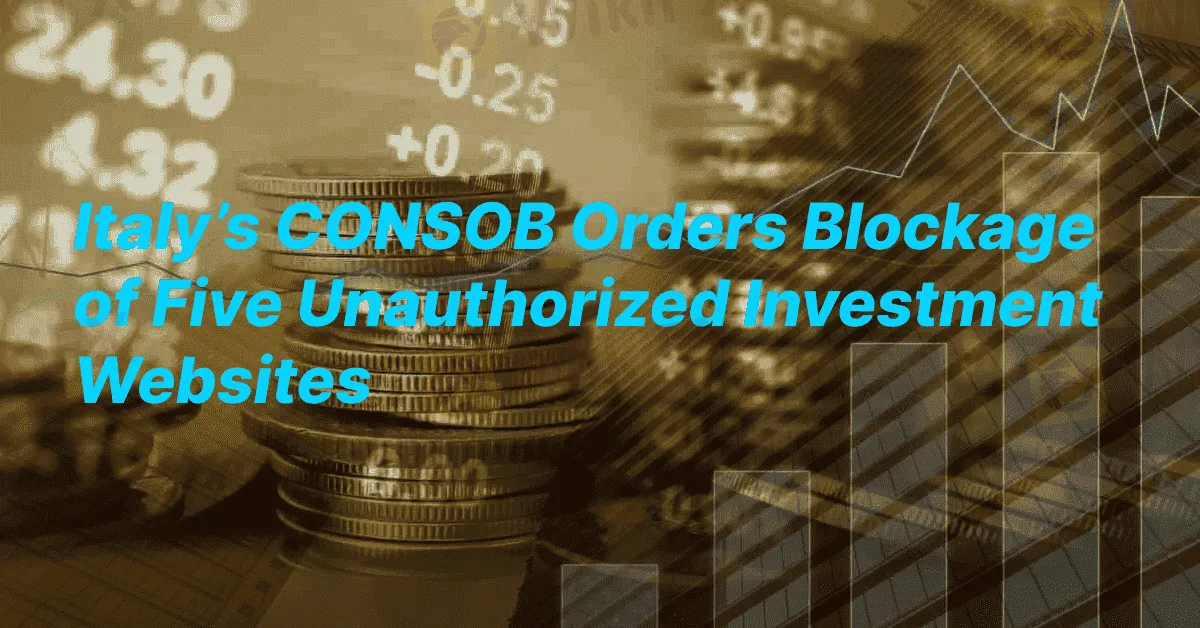简体中文
繁體中文
English
Pусский
日本語
ภาษาไทย
Tiếng Việt
Bahasa Indonesia
Español
हिन्दी
Filippiiniläinen
Français
Deutsch
Português
Türkçe
한국어
العربية
Italy’s CONSOB Orders Blockage of Five Unauthorized Investment Websites
Abstract:Italy’s Companies and Exchange Commission (CONSOB) has issued a fresh round of orders to block access to five unauthorized financial service websites operating without proper licenses.

Italys Companies and Exchange Commission (CONSOB) has issued a fresh round of orders to block access to five unauthorized financial service websites operating without proper licenses.
The websites identified in the latest crackdown include:
- IsecTrade – https://isectrade.net and https://panel.isectrade.net
- Morgantrust/Morgantrust Markets Limited – https://web.morgantrust.ai and https://www.morgantrust.ai
- Onlinecfdsim – https://www.onlinecfdsim.com and https://platform.onlinecfdsim.com
- CMC Finance Group – https://cmcfinanceltd.com and https://client.cmcfinanceltd.com
These sites have been blacklisted for offering financial services illegally, without the necessary regulatory approval. The action was taken under the powers granted to CONSOB by the Decreto crescita (Growth Decree), specifically Article 36, paragraph 2-terdecies of Law no. 58 (28 June 2019). This legislation allows CONSOB to direct internet service providers to block access to websites operating in Italy that offer financial services without authorization.
Since CONSOB gained this power in July 2019, it has blocked a total of 1,205 websites involved in fraudulent financial activities. Some of these sites belong to clone firms—fraudulent entities that impersonate legitimate financial institutions by copying details such as names, addresses, logos, and licenses in order to deceive potential victims into trusting them. These clones, however, have no real connection to the legitimate firms they mimic.
The blocking process is currently underway, but due to technical reasons, it may take several days for the measures to be fully implemented by internet service providers within Italy.
A Warning to Investors
CONSOB is urging investors to remain vigilant when choosing where to invest, emphasizing the importance of verifying whether financial service providers are properly authorized before committing funds. It is crucial to check whether the website you're dealing with is regulated and, for investment products, ensure that an official prospectus has been published.
In a statement, CONSOB highlighted that safeguarding ones savings requires common sense and careful research. By ensuring that the operator is authorized and that financial product offerings are legitimate, investors can better protect themselves from fraudulent schemes and make more informed decisions.
This latest action by CONSOB underscores Italys ongoing commitment to protecting investors from the growing risks posed by unauthorized and misleading financial services.

Disclaimer:
The views in this article only represent the author's personal views, and do not constitute investment advice on this platform. This platform does not guarantee the accuracy, completeness and timeliness of the information in the article, and will not be liable for any loss caused by the use of or reliance on the information in the article.
Read more

Why Trade Agreements Matter to Nations
In today’s interconnected world, trade agreements serve as the foundation for stable and predictable international commerce.

Trade Fights Are Heating Up—What Happens Next?
Global financial markets have become increasingly reactive to even minor developments in international trade talks.

Juno Markets Upgrades to FYNXT PAMM
Juno Markets has successfully upgraded its managed account infrastructure by integrating FYNXT’s Percent Allocation Management Module (PAMM) system.

Italy’s CONSOB Blocks Sites of ITradingFX and NEX TRADE in Latest Crackdown
Italy’s Companies and Exchange Commission (CONSOB) has ordered Internet service providers to block access to nine unauthorized investment websites, including “ITradingFX” and “NEX TRADE,” as part of its ongoing effort to curb abusive financial services Consob.
WikiFX Broker
Latest News
"Rate & Reward: Broker Review Contest"
FSRA Sanctions Hayvn Group and CEO for Regulatory Breaches and Misleading Conduct
2024 AI Ad-Blocking Performance Revealed
Why Are More Regulated Brokers Providing Free VPS Services?
SkyLine Guide 2025 Thailand Officially Launched: Judging Panel Formation Underway
Five UK Financial Firms Collapse, FSCS Offers Support for Affected Clients
Why Trade Agreements Matter to Nations
Non-Existent Online Scheme Took Away RM580,000
RM15 Million Gone in Fake Investment Scam
SEBI Issues Warning Against Social Media Investment Scams
Currency Calculator


